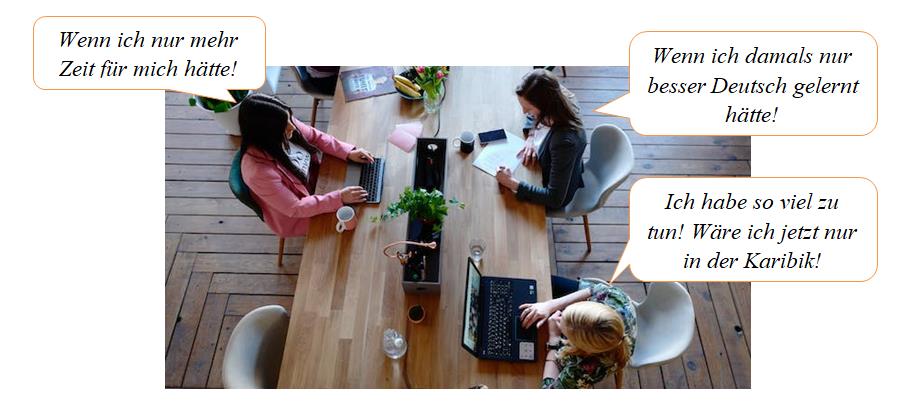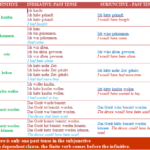In this lesson, you will learn everything about expressing wishes in German and desirous sentences, what they mean, how they are used, and what types of these sentences exist in German.
Thank you for reading this post, don't forget to subscribe!CONTENTS
What are desirous clauses?
Dependent clause with wenn
Position of the verb in the sentence
How to form desirous clauses in Subjunctive II?
Present Tense
würde + INFINITIVE
Past Tense
What are desirous clauses?
Desirous sentences, often referred to as unreal wishful sentences, allow us to express our deepest wishes without the constraints of reality. These sentences offer a glimpse into our aspirations, free from practical considerations, and are often considered unrealistic wishful sentences.
For example:
Wenn mein Mann hier wäre! – If my husband were here!
Hätte ich damals eine eigene Wohnung! – If I had my own apartment back then!
To express wishes, the verb must be in the subjunctive II.
Bloß doch, nur or doch nur often appear in desirous sentences.
There is an exclamation point at the end of the sentence.
Hätte ich doch nur ein wenig Zeit! – If only I had a little time!
Wärest du bloß etwas fleißiger! – If only you were a little more diligent!
The verb can be placed in the FIRST position in the sentence.
For example:
Wäre es doch nur wärmer!
Wäre ich bloß etwas beharrlicher!
If the desired sentence begins with the conjunction wenn, then the verb is placed at the end of the sentence.
For example:
Wenn ich doch nur mehr Geld hätte!
Wenn ich bloß fleißiger wäre.
Dependent clause with wenn
An unreal desirous sentence can be introduced with the conjunction wenn. Then the finite verb is at the end of the sentence.
For example:
Wenn ich doch schon weggegangen wäre.
Wenn ich nur den Bus erreicht hätte.
Nestvarne željne rečenice uvek pokazuju nešto što je suprotno od indikativa. Negativna stvarnost u indikativnoj rečenici predstavljena je pozitivno u željnoj rečenici i obrnuto.
Često se koristi pridev suprotnog značenjau komparativu.
Unreal wishful sentences always show something that is the opposite of the indicative. The negative reality in the indicative sentence is presented positively in the desiring sentence and vice versa. An adjective with the opposite meaning is often used in the comparative.
For example:
langweilig – interessanter
spät – früher
kalt – wärmer
Sentences:
INDIKATIVE SUBJUNCTIVE
Mein Vater hat nie Zeit. – Wenn er doch nur mehr Zeit hätte.
My father never has time. – If only he had more time.
Die deutsche Grammatik ist langweilig. – Wenn die deutsche Grammatik nur interessanter wäre.
German grammar is boring. – If only German grammar were more interesting.
Ich bin spät gekommen. – Wenn ich doch nur früher gekommen wäre.
I arrived late. – If only I had arrived earlier.
Ich habe meine Freundin Eva nicht selten getroffen. – Wenn ich sie doch nur öfter getroffen hätte.
I met my friend Eva not so often. – If only I had met her more often.
Er kann Deutsch nicht so gut sprechen. – Wenn er doch nur Deutsch besser sprechen könnte.
He can’t speak German very well. – If only he could speak German better.
Er arbeitet in seiner Firma viel. – Wenn er doch nur weniger arbeiten würde.
He works a lot at his company. – If only he worked less.
Position of the verb in the sentence
When a desirous sentence is formed without wenn, the finite verb is placed at the beginning of the sentence.
For example:
Wären Sie doch gestern länger geblieben!
Hätte ich sie nur früher kennengelernt !
Hätte ich das nun erledigt!
Wäre ich doch schon im Urlaub!
When a desirous sentence is formed with wenn, the finite verb is placed at the end of the sentence.
For example:
Wenn Sie doch gestern länger geblieben wären!
Wenn ich sie nur früher kennengelernt hätte!
Wenn ich das nun erledigt hätte!
Wenn ich doch schon im Urlaub wäre!
How to form desirous clauses in Subjunctive II?
The past tense subjunctive and the pluperfect subjunctive can be used in Unreal Desirous Clauses.
The Past tense subjunctive is used for the present and the future.
For example:
Wenn ich jetzt im Park wäre! – If I were in park now!
Er hätte jetzt gerne etwas Ruhe! – He would like some peace and quite now!
Jetzt häte ich gerne ein Vanillaeis! -Now I’d like a vanilla ice cream!
A desirous clause is an independent clause introduced by the conjunction wenn or without a conjunction. With the conjunction wenn, the finite verb stands at the end of the sentence
For example:
Wenn ich heute nur pünktlich zur Arbeit kommen würde! If only I would get to work on time today!
A finite verb can also be at the beginning of the sentence, for example: Ginge Jonas heute ins Theater! Hättest du auf mich gewartet!
Everything is easy if you know the past tense forms, isn’t it! Subjunctive II forms are created from the past tense of irregular verbs. The basic vowels -a-, -o-, -u- change to -ä-, -ö-, -ü-. The suffix -e is obligatory.
| infinitive | past tense | subjunctive II |
| kommen | kam | käme |
| lesen | las | läse |
| fahren | fuhr | führe |
The form würde + INFINITIVE serves as a substitute for the subjunctive II of weak verbs, when the subjunctive does not differ in form from the indicative.
For example:
Ich machte das nie. – Ich würde das nie machen. – I never did that. – I would never do that.
Wenn sie das fragte … – Wenn sie das fragen würde … – If she asked that… – If she would ask that …
In modern German, the form “würde + INFINITIV” is used with strong/irregular verbs, even though their subjunctive II forms differ from the indicative.
The subjunctive is generally used to express the speaker’s subjective attitude, indicating possibility, probability, assumptions, doubts, disbelief, and unreality. It is also used to express desire.
Subjunctive II characterizes an action as possible, probable, or unrealistic and unreal according to the speaker’s personal attitude. Using the subjunctive II can soften a harsher statement.
For example:
Er könnte es wissen. – He might know.
Wenn er härter arbeiten würde, könnte er eine Gehaltserhöhung bekommen. – If he worked harder, he could get a raise.
Könnten Sie bitte draußen telefonieren. – Could you please make a phone call outside.
The pluperfect subjunctive is used to express the past.
For example:
Wenn ich doch mehr Deutsch gelernt hätte. – If only I had learned more German.
Wenn ich nur davon früher gewusst hätte. – If only I had known about it earlier.
Wenn du doch gestern schon angekommen wärest. – If only you had arrived yesterday.
See more:



